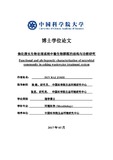Please use this identifier to cite or link to this item:
http://archive.nnl.gov.np:8080/handle/123456789/383| Title: | Functional and phylogenetic characterization of microbial community in coking wastewater treatment system |
| Authors: | Joshi, Dev Raj |
| Keywords: | increasing population |
| Issue Date: | 27-Mar-2019 |
| Abstract: | Ever increasing population and economic activities have necessitated high energy demand that encouraged heavy use of coal and its derivatives worldwide. Coking wastewater (CWW), generated from coal chemical industries including iron and steel manufacturing facilities is laden with hundreds of inorganic and organic pollutants which are normally difficult to remove via biological treatment. It is so called typical refractory organic wastewater with complex composition, high concentrations of pollutants, dark color, high toxicity, and prolonged stability. Although the concentrations and types of pollutants depend upon type of coal industry and waste recovery process, common pollutants include phenol and its derivatives, ammonia, sulfide, cyanide, thiocyanate, nitrogen heterocyclic compounds (NHCs) like aniline, carbazole, pyridine, indole, and quinolone, sulfur heterocyclic compounds like thiophenes, and numerous polycyclic aromatic hydrocarbons (PAHs). Many of these organic pollutants are potential carcinogenic and toxigenic agents causing serious risks to human, animals, and plants. Therefore, the discharge of untreated or improperly treated CWW into the environment causes detrimental effects on local ecosystems and obviously to human beings. |
| URI: | http://103.69.125.248:8080/xmlui/handle/123456789/383 |
| Appears in Collections: | 500 Natural sciences and mathematics |
Files in This Item:
| File | Description | Size | Format | |
|---|---|---|---|---|
| Dev_Ph.D._Thesis_full.pdf | 7.89 MB | Adobe PDF |  View/Open |
Items in DSpace are protected by copyright, with all rights reserved, unless otherwise indicated.